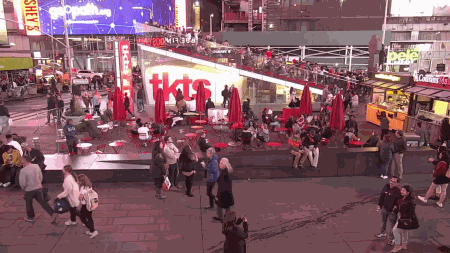OpenCV real time streaming video capture is slow. How to drop frames or get synced with real time?
Solution 1:

My hypothesis is that the jitter is most likely due to network limitations and occurs when a frame packet is dropped. When a frame is dropped, this causes the program to display the last "good" frame which results in the display freezing. This is probably a hardware or bandwidth issue but we can alleviate some of this with software. Here are some possible changes:
1. Set maximum buffer size
We set the cv2.videoCapture() object to have a limited buffer size with the cv2.CAP_PROP_BUFFERSIZE parameter. The idea is that by limiting the buffer, we will always have the latest frame. This can also help to alleviate the problem of frames randomly jumping ahead.
2. Set frame retrieval delay
Currently, I believe the read() is reading too fast even though it is in its own dedicated thread. This may be one reason why all the frames appear to pool up and suddenly burst in the next frame. For instance, say in a one second time interval, it may produce 15 new frames but in the next one second interval, only 3 frames are returned. This may be due to the network packet frame loss so to ensure that we obtain constant frame rates, we simply add a delay in the frame retrieval thread. A delay to obtain roughly ~30 FPS does a good job to "normalize" the frame rate and smooth the transition between frames incase there is packet loss.
Note: We should try to match the frame rate of the stream but I'm not sure what the FPS of the webcam is so I just guessed 30 FPS. Also, there is usually a "direct" stream link instead of going through a intermediate webserver which can greatly improve performance.
If you try using a saved .mp4 video file, you will notice that there is no jitter. This confirms my suspicion that the problem is most likely due to network latency.
from threading import Thread
import cv2, time
class ThreadedCamera(object):
def __init__(self, src=0):
self.capture = cv2.VideoCapture(src)
self.capture.set(cv2.CAP_PROP_BUFFERSIZE, 2)
# FPS = 1/X
# X = desired FPS
self.FPS = 1/30
self.FPS_MS = int(self.FPS * 1000)
# Start frame retrieval thread
self.thread = Thread(target=self.update, args=())
self.thread.daemon = True
self.thread.start()
def update(self):
while True:
if self.capture.isOpened():
(self.status, self.frame) = self.capture.read()
time.sleep(self.FPS)
def show_frame(self):
cv2.imshow('frame', self.frame)
cv2.waitKey(self.FPS_MS)
if __name__ == '__main__':
src = 'https://videos3.earthcam.com/fecnetwork/9974.flv/chunklist_w1421640637.m3u8'
threaded_camera = ThreadedCamera(src)
while True:
try:
threaded_camera.show_frame()
except AttributeError:
pass
Solution 2:
Attempt at threading
I've attempted this solution from nathancy with minor success.
It involves:
- creating a separate thread for image capture from the source
- using the main thread exclusively for display.
Code:
import cv2
from threading import Thread
class ThreadedCamera(object):
def __init__(self, source = 0):
self.capture = cv2.VideoCapture(source)
self.thread = Thread(target = self.update, args = ())
self.thread.daemon = True
self.thread.start()
self.status = False
self.frame = None
def update(self):
while True:
if self.capture.isOpened():
(self.status, self.frame) = self.capture.read()
def grab_frame(self):
if self.status:
return self.frame
return None
if __name__ == '__main__':
stream_link = "https://videos3.earthcam.com/fecnetwork/9974.flv/chunklist_w1421640637.m3u8"
streamer = ThreadedCamera(stream_link)
while True:
frame = streamer.grab_frame()
if frame is not None:
cv2.imshow("Context", frame)
cv2.waitKey(1)
Jittery, but real-time results
 .
.
The streaming works. It maintains real-time. However, it is as if all the frames pool up and suddenly burst into the video. I would like somebody to explain that.
Room for improvement
The real-time stream can be found here.
https://www.earthcam.com/usa/newyork/timessquare/?cam=tsstreet
This site is scraped for the m3u8 using python's streamlink stream scraper.
import streamlink
streams = streamlink.streams("https://www.earthcam.com/usa/newyork/timessquare/?cam=tsstreet")
print(streams)
which yeilds:
OrderedDict([
('720p',<HLSStream('https://videos3.earthcam.com/fecnetwork/9974.flv/chunklist_w202109066.m3u8')>),
('live', <RTMPStream({'rtmp': 'rtmp://videos3.earthcam.com/fecnetwork/', 'playpath': '9974.flv', 'pageUrl': 'https://www.earthcam.com/usa/newyork/timessquare/?cam=tsstreet','swfUrl': 'http://static.earthcam.com/swf/streaming/stream_viewer_v3.swf', 'live': 'true'}, redirect=False>),
('worst', <HLSStream('https://videos3.earthcam.com/fecnetwork/9974.flv/chunklist_w202109066.m3u8')>),
('best', <RTMPStream({'rtmp': 'rtmp://videos3.earthcam.com/fecnetwork/', 'playpath': '9974.flv', 'pageUrl': 'https://www.earthcam.com/usa/newyork/timessquare/?cam=tsstreet', 'swfUrl': 'http://static.earthcam.com/swf/streaming/stream_viewer_v3.swf', 'live': 'true'}, redirect=False>)
])
The possibility that the streams are being read wrong.